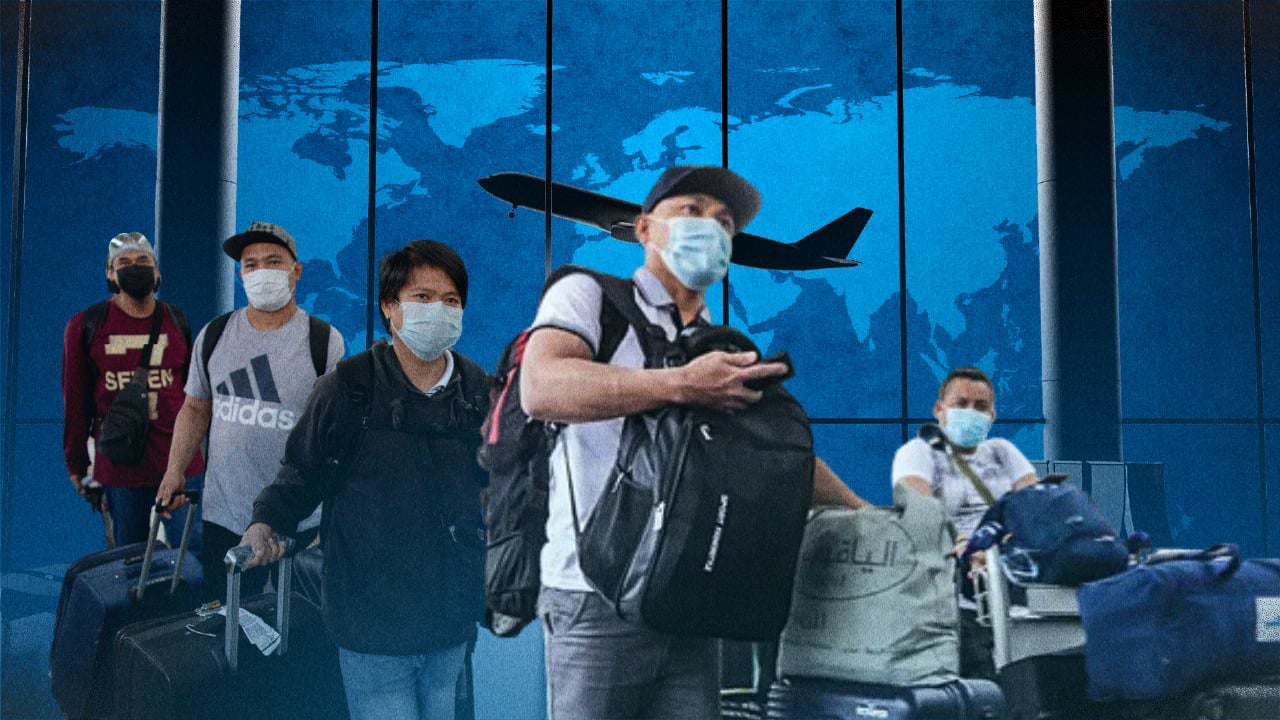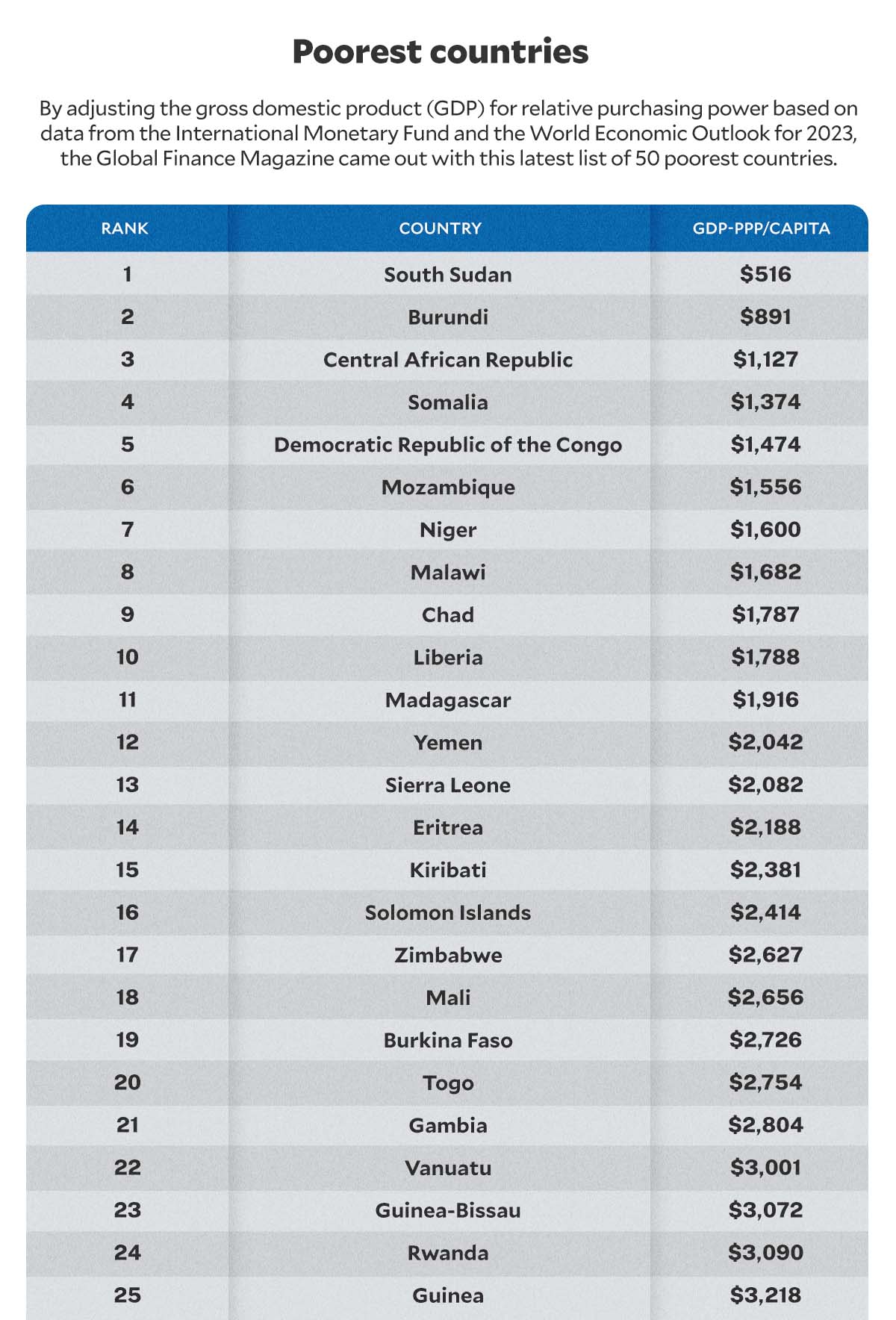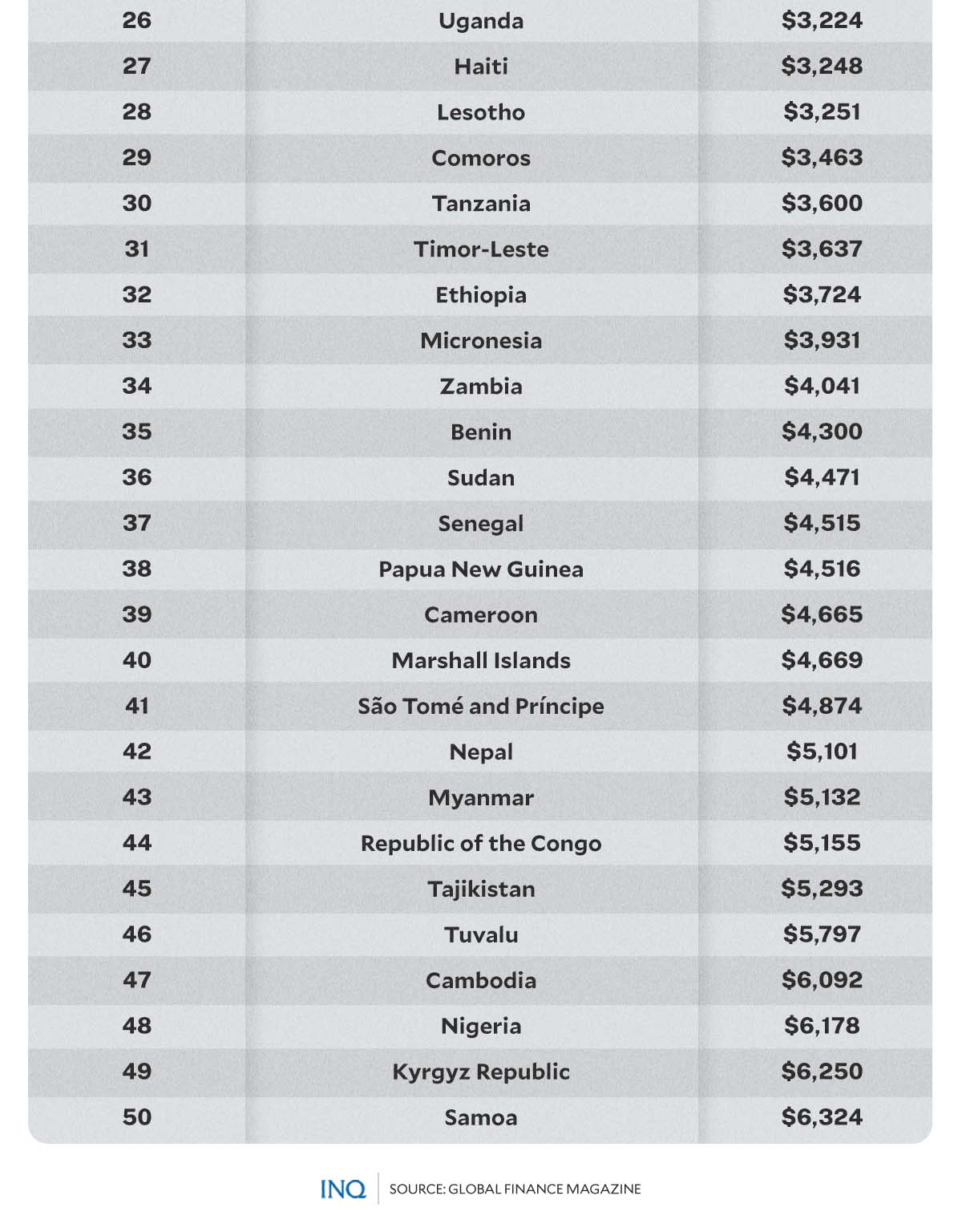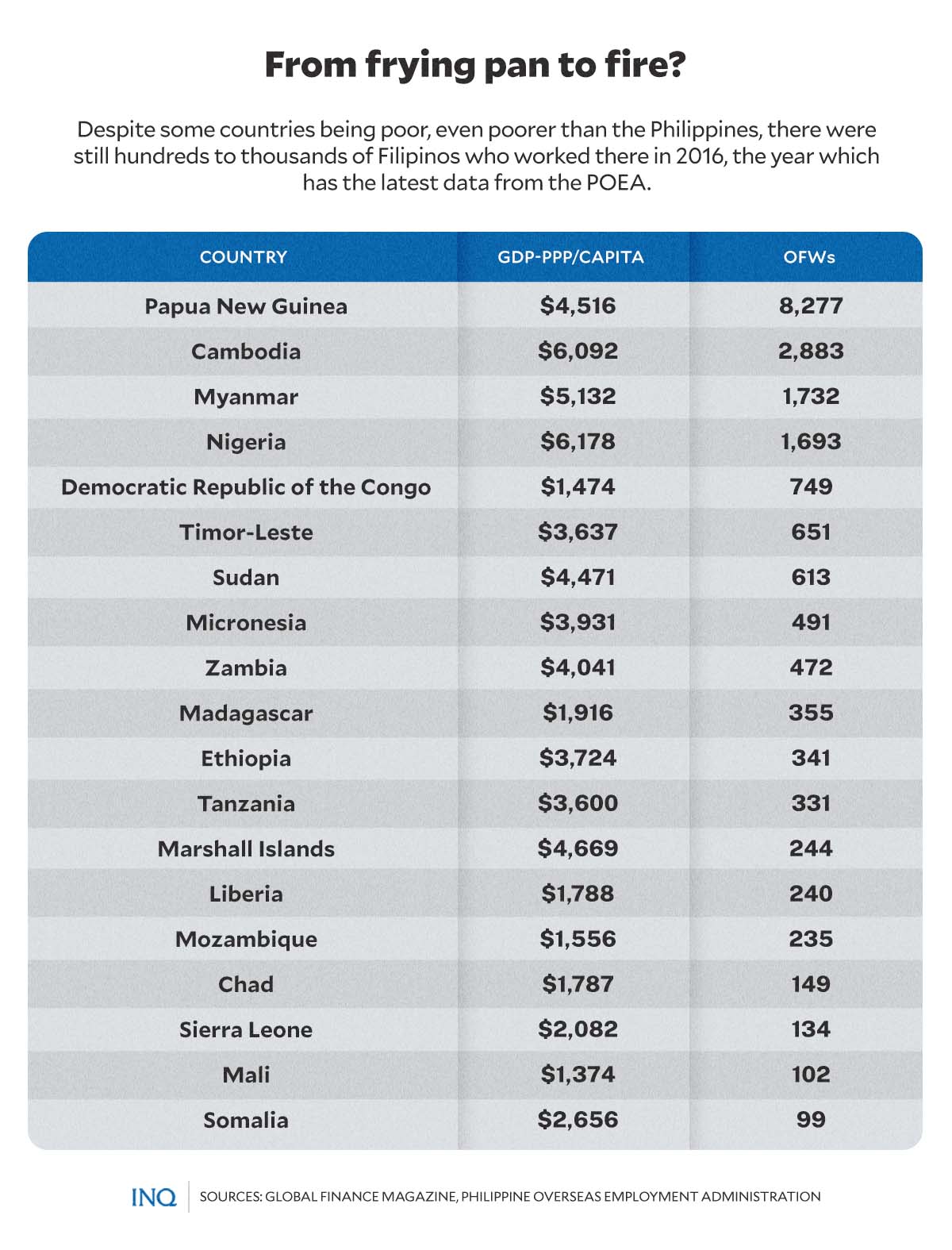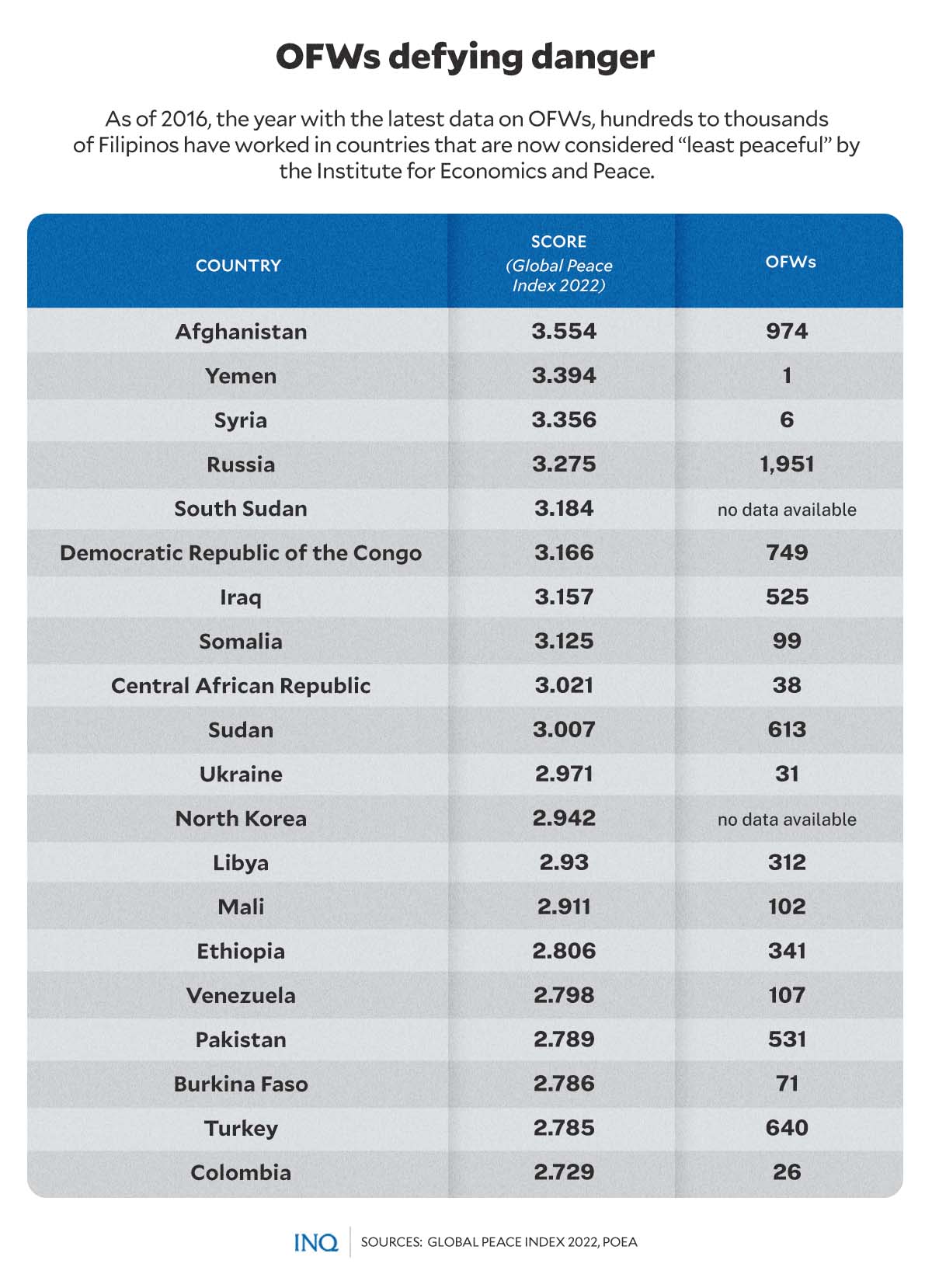‘Kapit sa patalim’: The risks OFWs take in countries even poorer than PH
MANILA, Philippines—As hundreds of Filipinos marched last May 1 to mark International Workers’ Day, Migrante Philippines, a group advocating for the rights of overseas Filipino workers (OFWs), had this to say: “Trabaho sa Pilipinas, hindi sa labas(Jobs in the Philippines, not abroad).”
This call reverberated throughout the streets of Manila, but what made it more relevant is the fact that millions of Filipinos are still working overseas despite the risks they may have to deal with, like what is happening to OFWs in Sudan.
Last April 15, an armed conflict erupted in Sudan, which is the largest country by area in Africa. The fighting has already killed over 600 people, while thousands, including Filipinos, have fled across borders.
Foreign Affairs Undersecretary for Migrant Workers Affairs Eduardo Jose de Vega, said an initial group of 156 Filipinos was ready to leave “at any given moment” on April 24, but the number that the embassy has been tracking later rose to almost 700.
READ: Evacuation of OFWs in Sudan under way – DFA
Last April 27, the Department of Migrant Workers (DMW) and the Department of Foreign Affairs (DFA) said 409 Filipinos have already been evacuated from the conflict in Sudan.
Article continues after this advertisementThe DMW and the DFA said the 409 comprised 335 OFWs with their families, while the rest are students of Islamic studies in the African country. It was said that the evacuees used the 72-hour truce of the fighters to escape.
Article continues after this advertisementHowever, on May 10, the DFA said between 50 and 60 Filipinos are still in Sudan, with some asking for financial assistance as they consider whether to evacuate the strife-stricken country.
RELATED STORY: Migrante to gov’t: Help stranded OFWs
As stressed by Foreign Affairs Assistant Secretary for Migrant Workers Paul Cortes, many of those who are still in Sudan are with their Sudanese spouses or with their employers.
READ: Still 60 Pinoys stuck in Sudan
Seeking a ‘chance’ overseas
Based on latest data from the Philippine Statistics Authority (PSA), there were 1.83 million OFWs in 2021, which consisted of 96.4 percent with existing work contracts and 3.6 percent without working visa or work permits.
The United Nations Children’s Fund (Unicef) said some people choose to work overseas because there are limited opportunities in their communities – or available jobs do not pay enough to sustain a family.
The PSA, sharing the results of the Survey on Overseas Filipinos, said the number of OFWs increased by 3 percent from 1.77 million in 2020, but still below 2.2 million in 2019.
The 1.77 million OFWs in 2020 consisted of 1.71 million who had existing work contracts and 64,000 OFWs who did not have valid working visas and work permits but were employed and working full-time.
Most OFWs were from Calabarzon (15.9 percent), Central Luzon (15.5 percent), Western Visayas (9.8 percent), Ilocos Region (8.9 percent), Metro Manila (8.3 percent), and Cagayan Valley (7.1 percent).
The PSA said the top five destinations of OFWs in 2021 were Asia (78.3 percent), Europe (9.3 percent), North and South America (8.9 percent), Australia (2.2 percent) and Africa (1.3 percent).
Out of the 1.83 million OFWs in 2021, 24.4 percent worked in Saudi Arabia, while 14.4 percent were in the United Arab Emirates (UAE). Some 6.7 percent worked in Hong Kong, 5.9 percent in Kuwait, 5.8 percent in Singapore, and 4.8 percent in Qatar.
Leaving PH for richer states
As stressed by Unicef in a policy paper, even if hard, some Filipinos work overseas because “higher-paying jobs elsewhere may allow them to improve their family’s living conditions.”
RELATED STORY: Is it really poverty that drives Filipinos overseas?
Based on data from the National Wages and Productivity Commission, the average minimum wage in the Philippines is only P8,902 a month, P3,128 or 26 percent less than the already low P12,030 poverty threshold.
This was the reason that some Filipinos leave the Philippines for far richer countries like Saudi Arabia, UAE, Hong Kong, Kuwait, Singapore and Qatar, where thousands of OFWs are staying.
As expressed by the Global Finance Magazine, which made a list of the richest and poorest countries in the world by adjusting the gross domestic product (GDP) for relative purchasing power, the Philippines has a GDP-PPP per capita of only $11,420.
This is way lower than Saudi Arabia’s $64,836, UAE’s $88,221, Hong Kong’s $74,598, Kuwait’s $53,037, Singapore’s $133,895, and Qatar’s $124,848. Singapore and Qatar, based on the list, are considered to be the third and fourth richest countries in the world.
Take the case of Saudi Arabia and Hong Kong, which have been the “home” for 460,121 and 116,467 OFWs in 2016, the year with the latest and detailed Philippine Overseas Employment Administration (POEA) statistics on OFWs.
Compared to the Philippines, an OFW in Saudi Arabia and Hong Kong will likely make 5.5 times and 7 times more money, based on data from the website My Life Elsewhere.
Likewise, a person living in Hong Kong is said to be 42.7 percent less likely to be jobless, while in UAE, where 276,278 OFWs have worked in 2016, someone is said to be 68.7 percent less likely to be jobless.
Ironic
But while it is easy to understand why thousands of Filipinos decide to work in rich countries, it may be hard to commiserate with as to why some OFWs are willing to take risks in poor countries, even poorer, sometimes more dangerous, than the Philippines.
Take the case of Sudan, where 613 OFWs have worked in 2016.
Sudan is way poorer than the Philippines as its GDP-PPP per capita is only $4,471, the 36th lowest in the Global Finance Magazine’s list. Its score of 32.8 in the 2023 Index of Economic Freedom is also way lower than the Philippines’ 59.3.
Based on data from the website My Life Elsewhere, a person in Sudan is 50 percent less likely to make more money and 2.8 times more likely to live below the poverty line than in the Philippines.
But still, there are OFWs there, as in Papua New Guinea, Cambodia, Myanmar, Nigeria, Democratic Republic of the Congo (DRC) and Timor Leste, countries that are even poorer than the said African country where conflict erupted.
RELATED STORY: Stray bullet, flying shrapnel hurt 2 OFWs in Sudan conflict — DMW
The GDP-PPP per capita is only $4,516 in Papua New Guinea, $6,092 in Cambodia, $5,132 in Myanmar, $6,178 in Nigeria, $1,474 in DRC, and $3,637 in Timor-Leste, based on data from the Global Finance Magazine.
However, despite this, thousands of Filipinos have worked and continue to work there: 8,277 in Papua New Guinea, 2,883 in Cambodia, 1,732 in Myanmar, 1,693 in Nigeria, 749 in DRC, and 651 in Timor-Leste.
Even in countries that are least peaceful, based on the Global Peace Index 2022, there are also thousands of OFWs who take chances for a better life not only for them but for their families, too.
The Institute for Economics and Peace said Afghanistan (3.554), Yemen (3.394), Syria (3.356), Russia (3.275), and South Sudan (3.184) were the five “least peaceful” countries last year.
But based on data from POEA in 2016, there were still Filipinos who worked there despite the risks they may have to deal with. Afghanistan and Russia were home to 974 and 1,951 OFWs in 2016, respectively.
No choice but to leave
As stressed by the Philippine Overseas Labor Office, “whether we like it or not, the top reason why many Filipinos choose to work abroad is due to the plenty of career opportunities in foreign countries.”
“So if you will look for career opportunities outside the Philippines, chances are you will find more job openings” and that “some careers are more in demand in other countries, such as welders, domestic helpers, and housekeeping-related jobs.
Sonny Africa, executive director of the think tank Ibon Foundation, previously told INQUIRER.net that “the economy isn’t creating enough formal high-quality work because its agricultural and industrial foundations are so weak.”
As stated by Migrante International, “the civil war in Sudan and emergencies in many countries alert us to the dangers of forced labor migration.”
“These, together with rising unemployment in the country, show us the need to create decent jobs at home, so that Filipinos are not forced to leave the Philippines to find jobs abroad.”
It said “instead of intensifying [the] implementation of the government’s labor export program, the Marcos regime should subject this to critical analysis, develop industries and agriculture, and seek to create decent and long-term jobs in the Philippines.”
